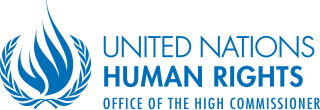
The Office of the United Nations High Commissioner for Human Rights (OHCHR) is a department of the United Nations Secretariat that works to promote and protect human rights that are guaranteed under international law and stipulated in the Universal Declaration of Human Rights of 1948. The office was established by the United Nations General Assembly on 20 December 1993 in the wake of the 1993 World Conference on Human Rights.

The United Nations Convention on the Law of the Sea (UNCLOS), also called the Law of the Sea Convention or the Law of the Sea Treaty, is an international agreement that establishes a legal framework for all marine and maritime activities. As of May 2023, 168 countries and the European Union are parties.

The Charter of the United Nations (UN) is the foundational treaty of the United Nations. It establishes the purposes, governing structure, and overall framework of the UN system, including its six principal organs: the Secretariat, the General Assembly, the Security Council, the Economic and Social Council, the International Court of Justice, and the Trusteeship Council.

The United Nations Secretariat is one of the six principal organs of the United Nations (UN), The secretariat is the UN's executive arm. The secretariat has an important role in setting the agenda for the deliberative and decision-making bodies of the UN, and the implementation of the decision of these bodies. The secretary-general, who is appointed by the General Assembly, is the head of the secretariat.

The Outer Space Treaty, formally the Treaty on Principles Governing the Activities of States in the Exploration and Use of Outer Space, including the Moon and Other Celestial Bodies, is a multilateral treaty that forms the basis of international space law. Negotiated and drafted under the auspices of the United Nations, it was opened for signature in the United States, the United Kingdom, and the Soviet Union on 27 January 1967, entering into force on 10 October 1967. As of March 2024, 115 countries are parties to the treaty—including all major spacefaring nations—and another 22 are signatories.

The Vienna Convention on the Law of Treaties (VCLT) is an international agreement that regulates treaties among sovereign states.

The Seabed Arms Control Treaty is a multilateral agreement between the United States, Soviet Union, United Kingdom, and 91 other countries banning the emplacement of nuclear weapons or "weapons of mass destruction" on the ocean floor beyond a 12-mile (22.2 km) coastal zone. It allows signatories to observe all seabed "activities" of any other signatory beyond the 12-mile zone to ensure compliance.

Law of the sea is a body of international law governing the rights and duties of states in maritime environments. It concerns matters such as navigational rights, sea mineral claims, and coastal waters jurisdiction.

The United Nations Office on Drugs and Crime is a United Nations office that was established in 1997 as the Office for Drug Control and Crime Prevention by combining the United Nations International Drug Control Program (UNDCP) and the Crime Prevention and Criminal Justice Division in the United Nations Office at Vienna, adopting the current name in 2002.

The United Nations Commission on International Trade Law (UNCITRAL) is a subsidiary body of the U.N. General Assembly (UNGA) responsible for helping to facilitate international trade and investment.

The United States is not a state party to the Rome Statute of the International Criminal Court, which founded the International Criminal Court (ICC) in 2002.

The United Nations General Assembly Sixth Committee is one of six main committees of the General Assembly of the United Nations. It deals primarily with legal matters and is the primary forum for the consideration of international law and other legal matters concerning the United Nations.

The Arms Trade Treaty (ATT) is a multilateral treaty that regulates the international trade in conventional weapons.

The United States was among the nations that participated in the third United Nations Conference on the Law of the Sea, which took place from 1974 through 1982 and resulted in the international treaty known as the United Nations Convention on the Law of the Sea (UNCLOS). The United States also participated in the subsequent negotiations of modifications to the treaty from 1990 to 1994. The UNCLOS came into force in 1994. Although the United States now recognizes the UNCLOS as a codification of customary international law, it has not ratified it.
John Henricus de Saram is a Sri Lankan lawyer and diplomat, who served as Permanent Representative of Sri Lanka to the United Nations in New York. He was a former Director of the Office of the Legal Counsel, United Nations Office of Legal Affairs and was a former member of the United Nations International Law Commission.
In international law, a depositary is a government or organization to which a multilateral treaty is entrusted. The principal functions of a depositary are codified in Article 77 of the Vienna Convention on the Law of Treaties.

Anna Joubin-Bret is a French lawyer. She is the Secretary of the United Nations Commission on International Trade Law (UNCITRAL) and Director of the International Trade Law Division (ITLD) in the Office of Legal Affairs (OLA) of the UN Secretariat since 2017.
The 1973 United Nations International Convention on the Suppression and Punishment of the Crime of Apartheid was the first binding international treaty which declared the crime of apartheid and racial segregation under international law. It was adopted by the General Assembly on 30 November 1973 and came into force on 18 July 1976. It passed by 91 votes in favor, four against and 26 abstentions. 110 countries are currently parties to the convention, with 26 signatories.
Constantin Stavropoulos was the former Undersecretary General of the United Nations Office of Legal Affairs of the United Nations.














